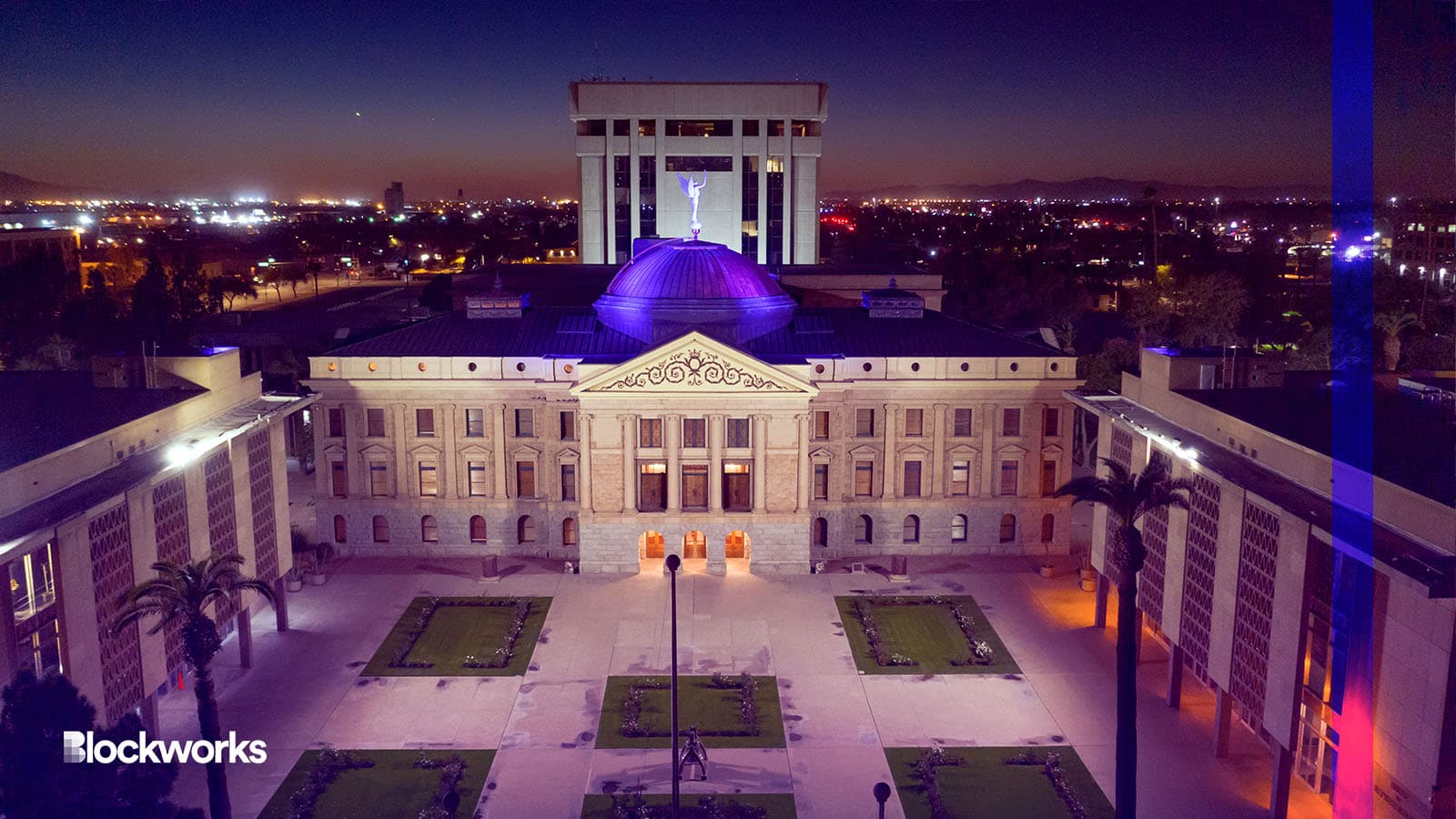These 5 Crypto-friendly US States Show Initiative on Tax Laws
As federal tax deadline looms, here’s where some of the friendliest US states stand on reforms

Arizona Capitol building in Phoenix USA; Source: Shutterstock / Real Window Creative, modified by Blockworks
Looking to the future, policymakers in Arizona referred an amendment to the state constitution in the Arizona State Legislature last week, seeking to exempt digital assets from property taxation.
Following its second reading on Jan. 23, the resolution now has a small shot of making it to a ballot initiative. If approved by a majority vote in the legislature and subsequently passed by voters, the amendment would make crypto tax-exempt at the state level.
It would also make it one of the more favorable states for tax purposes, alongside Wyoming, which passed a law recognizing a DAO’s legal status as akin to a limited liability company.
Arizona had originally toyed with the idea of making bitcoin legal tender early last year, but that bill was subsequently shelved shortly after being introduced.
On a federal level, all individuals are required to pay income and capital gains taxes, but individual US states approach taxation differently, with some eschewing the concept of capital gains or personal income tax altogether at the state level.
Income tax at the state level is triggered when a user produces additional income deriving from mining, staking or airdrops, while capital gains (or losses) are triggered when a cryptoasset is disposed of on the basis of its cost basis and sale price.
Aside from Arizona, here are four other “friendly” states based on regulatory and tax advantages ahead of the federal tax filing deadline come April 18.
Wyoming
Wyoming, long-viewed as one of the country’s most progressive crypto regions, does not collect personal or corporate income tax. The state also began regulating the industry early on by introducing a financial technology sandbox for testing financial products and services.
As mentioned, it formally legalized DAOs in 2019, allowing for clearer guidelines on how those entities would be taxed. Typically, LLCs don’t pay taxes on business incomes, but instead, members are required to pay taxes on their share of the LLC’s profits.
The state also passed its charter for banks dealing in digital assets back in 2019 making it possible for crypto firms to both hold customer cash deposits and custody crypto — later able to be traded on exchanges.
High electricity prices have caused some crypto miners to balk at setting up shop in the state, though Wyoming has recently attempted to tackle the issue by introducing two bills that may result in bitcoin miners paying less.
Texas
Like Wyoming, Texas allowed for chartered banks to custody digital assets in June 2021, which was viewed at the time as a way to tap into the state’s booming domestic crypto market.
Coinciding with its cheap electricity — beneficial to crypto mining activity two years ago — the state also features no income tax. Still, Texas does not recognize crypto as legal money and instead is concerned with the asset class as a taxable commodity on a transactional basis.
The state does not require firms, such as exchanges, to obtain a money transmitter’s license. It also passed its Texas Virtual Currency Bill in 2021 which provides a legal definition of digital assets. There is no income tax in the state.
Miners too benefit from a favorable framework that was put in place for firms to profit from 10-year tax abatements and tax credits, alongside additional state training for their workforce.
Florida
Florida, like Wyoming and Texas, does not feature a state income tax.
The state has a number of high-profile politicians opting for local crypto and blockchain regulation, including Miami Mayor Francis Suarez, who previously pushed for city residents to receive their paychecks and pay for their property taxes in bitcoin.
While the state’s governor Ron DeSantis floated the idea of allowing businesses to pay taxes using crypto to Florida’s Legislature’s 2022 session, his proposed measures failed to pass.
As such, the state currently does not address the sales and use tax treatment of transactions involving crypto though, like Wyoming, a money transmission license is not required courtesy of changes made to House Bill 273.
Colorado
Colorado, unlike other states listed, does tax income at 4.55% including wages and salaries deriving from crypto activity.
The outlier here is that Colorado is attempting to position itself as a crypto-friendly state by ensuring broader digital asset use cases for tax purposes.
In September of last year, Colorado’s Department of Revenue began accepting crypto as an additional form of payment for all resident taxpayers, becoming the first US state to do so.
That includes individual income tax, business income tax, sales and use tax, withholding tax, severance tax and excise fuel tax.
Start your day with top crypto insights from David Canellis and Katherine Ross. Subscribe to the Empire newsletter.





